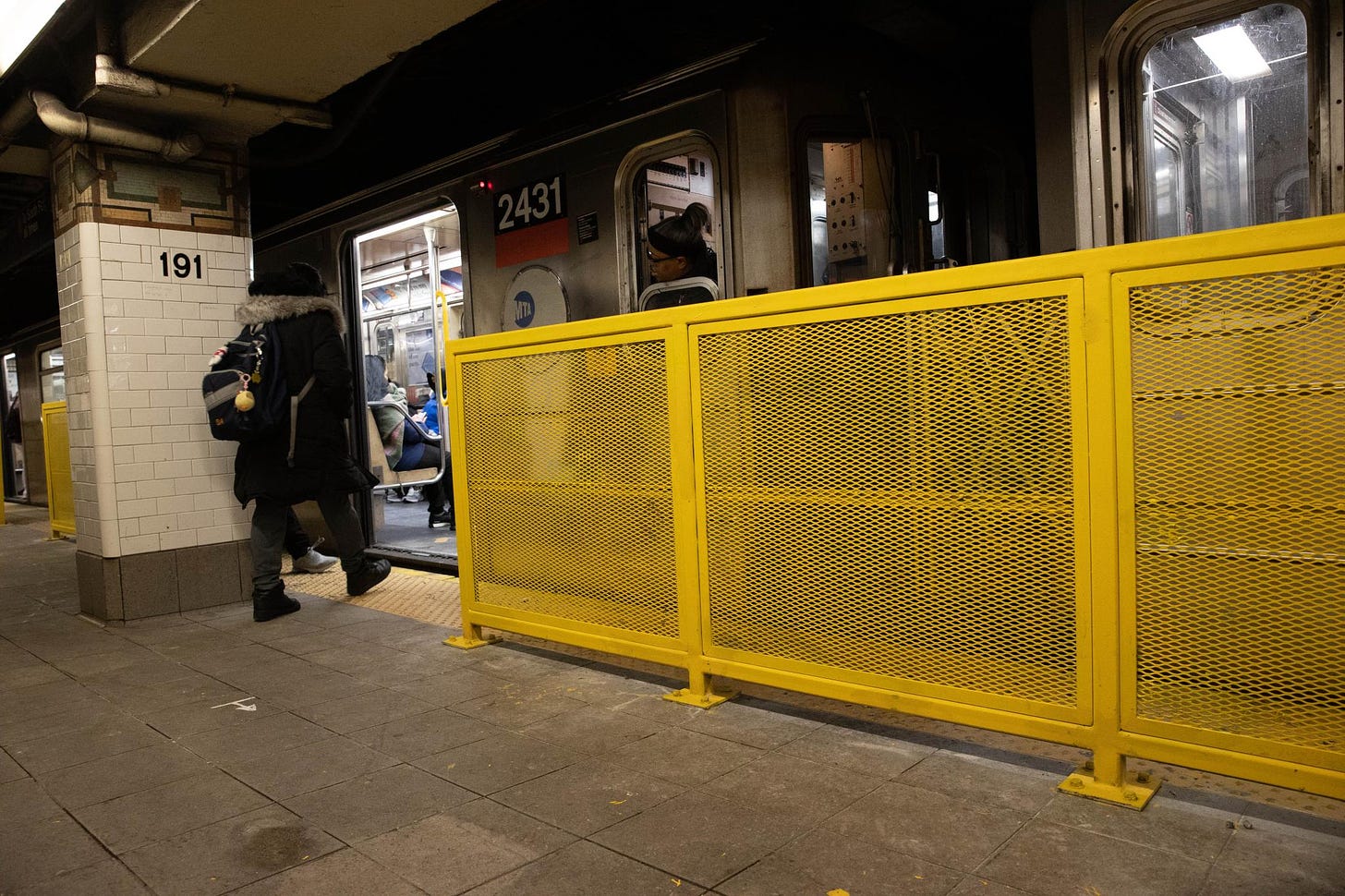
Sometimes the least impressive objects say the most. In New York, the transport authorities recently installed yellow metal barriers along the subway platform at 191st St Station, leaving only small gaps for passengers to board trains. The fences are being trialled as a way to stop people falling, jumping, and being pushed into the tracks. They caught my eye because, as a foreign observer, they resonate with a growing narrative about the decay of American cities – a narrative in which the New York subway plays a leading role. Last week I suggested the United States’ cultural influence in other countries is overstated, but this much I’ll admit: Americans are good at broadcasting their anxieties about their own country’s decline.
This broken cities discourse reached a new pitch this week when Tucker Carlson, the former Fox talk show host, reflected on his recent trip to Moscow. Speaking to an audience in Dubai, Carlson said the Russian capital was “so much nicer than any city in my country… so much cleaner and safer and prettier, aesthetically, the architecture, the food, the service.” He made special mention of the New York subway of course. Carlson’s remarks were controversial to put it mildly, but for many months now, social media has been overflowing with videos of American cities looking dirty and dilapidated, riddled with crime, drug abuse and homelessness. Though much of this reporting is overtly political, aimed a criticising the Democrats’ urban governance, I’ve personally heard similar horror stories from a number of New Yorkers over the past year.
But it isn’t just American cities. I see another daily stream of videos documenting anti-social or violent behaviour in London, again focused on the Tube, and friends speak of their frustration and nervousness with where the British capital is heading. The dramatic riots in various French cities last summer suggest a certain volatility across the channel too.
Having escaped London myself nine months ago – and having moaned about the decline of its public life in the past – I want to avoid indulging in too much Jeremiad on this subject. Like New York and Paris, London obviously remains a great city, and one that millions are proud to call home. I’ve come to suspect that cities are vulnerable to negative feedback loops in perception, where any experience of deterioration makes people more likely to notice bad things happening around them, even if many of those bad things are not actually new. On the other hand, there is plenty of evidence that the deterioration is real, such as big increases in London’s knife crime and thefts on the Underground.
These anxieties have a peculiar weight because, ever since their appearance on the historical stage, cities have been synonymous with civilisation itself. Rarely has there been one without the other. More importantly, cities have been treated as emblematic of the fate of particular civilisations. And so, from the Book of Revelations to Dickens, tales of urban corruption amplify more general fears that society is going down the pan.
Metal barriers on the subway are evocative not just in their function, but in their form. Devices to stop inebriated or disturbed people from causing fatal damage are already suggestive of social breakdown; but the ugliness of those devices speaks to a corresponding loss of civic pride, and a lack of care for the communal environment. In this way, design becomes bound up with our perceptions of urban decline, perceptions which can create their own realities. This year marks the 100-year anniversary of the red phone box, devised by one of the great London designers, Giles Gilbert Scott. Though it looks somewhat old-fashioned today, here is an artefact with enough character that it has become a symbol of Britain itself. Contrast that with another famous cubicle, the unbelievably depressing prayer facility in Bristol Airport’s car park, which attracted universal ridicule last year. Such monstrosities feel like a symptom of neglect, but also a cause: why would anyone show love towards public spaces that treat them with such stinginess?
Public design is not all bad. The new Blackfriars station, whose rail platforms span the Thames, is probably my favourite in the world. By and large though, the objects that mediate urban life feel increasingly hostile: security cameras, entryphone systems, spiked railings, aggressive signage, and various measures to ward off homeless people. It is revealing that transit systems are now attracting so much concern: this is one of the few places where we still have to interact with a cross-section of the city, and only because we need it to get where we are going. We have a lot to learn from cities like Copenhagen and Stockholm, where I found that even portacabins at construction sites are made to look pleasing.
But while ugly design can make life in cities a good deal worse, the sad truth is that thoughtful and generous design cannot by itself repair a fraying social fabric. In the 1970s, architects were depressed to find the London housing estates they had carefully designed for poor residents were often swiftly vandalised. The assumption that nice things will simply be trashed is one reason our urban spaces are clad in cheap aluminium and Perspex today. Maybe it’s time to try a completely different approach. Chris Arnade makes the fascinating argument that, where the authorities are unable or unwilling to provide decent amenities, we would be better off emulating poorer countries and allowing people to improvise their own public design.
It is much easier to hide problems than to solve them. Some of Europe’s most admired urban cores, notably Haussmann’s Paris and Franz Joseph’s Vienna, were developed in response to the squalor of industrialising cities in the nineteenth century. Yet no provision was made for the inhabitants of slums that were cleared to make way for fine buildings and boulevards. They were simply pushed away from the centre, a pattern which has often been repeated. Today 80 percent of Parisians live beyond the périphérique that marks the boundary of the historic city, some of them in banlieues often compared to ghettos. In the United States, as Albert Pope writes, those priced-out of gentrifying neighbourhoods are “pushed out into a suburban oblivion… defined by cultural, political, and economic exclusion.” During my years in London I saw the same informal expulsion taking place in a number of areas.
Such population sorting allows some parts of the city to look rather nice. Gentrification brings in its wake a new syntax of flower boxes, pedestrianised streets and cafés with elegant outdoor seating. I don’t blame anyone for wanting to live in these places, and nor could I, having left the city altogether. But this polarisation between affluent and deprived enclaves creates a situation that is inherently unstable. It only deepens the social crises that ultimately spill out and affect the city as a whole.






Excellent point Wessie about "negative feedback loops in perception". I had not thought of that before but it makes so much sense. This dynamic not only forms when you begin to notice ugly or degrading things but also when you are exposed to the good (like the work Create Streets are doing). When exposed to the better, you begin to see how most of that which is around you does not conform to that standard - even if you thought that these buildings (for instance) were "ok" before.
Another example would be the Lake District. Most (including me) see this landscape as rugged and sublime - but increasingly vocal environmentalists are crying it is "sheepwrecked" and depressingly bleak - and now people are beginning to question the aesthetics of other national parks (I don't agree with the sheepwrecked argument, though I can see their point from an ecological perspective)
A bit off topic, but on the subject of America's homogenization in the world that you mentioned, I remembered about an interesting book I have, however, which I haven't read yet!
"Crazy Like Us: The Globalization of the American Psyche" by the journalist Ethan Watters.
What I could dig taking a rapid look here is that Ethan talks how the american psychiatric establishment has influenced all over the world, with its ideas of mental health, its faulty diagnosing and questionable labels like the oversaturated "PTSD" —all from DSM-5.
Of course this is a limited summary, the book (that I haven't read yet) is probably much more rich and interesting.
Now you see, USA was capable of influencing over the world, how people, be patients be professionals see their inner selves, this might change your idea that downplays american homogenization.
This one is lovely also:
https://www.salon.com/2013/07/31/living_in_america_will_drive_you_insane_literally_partner/